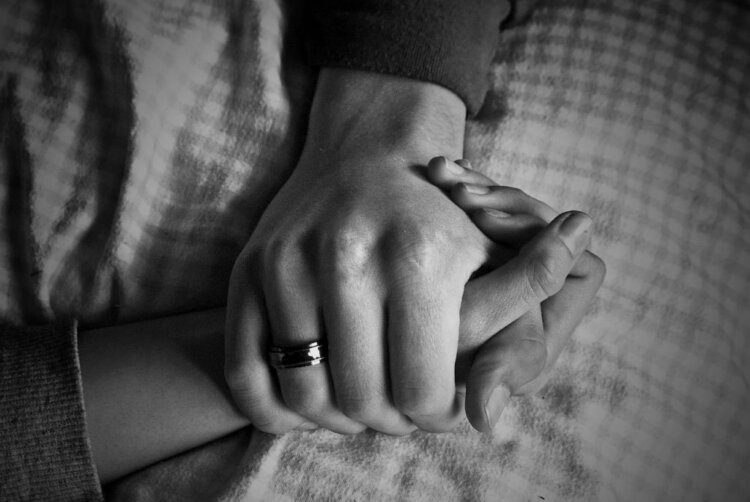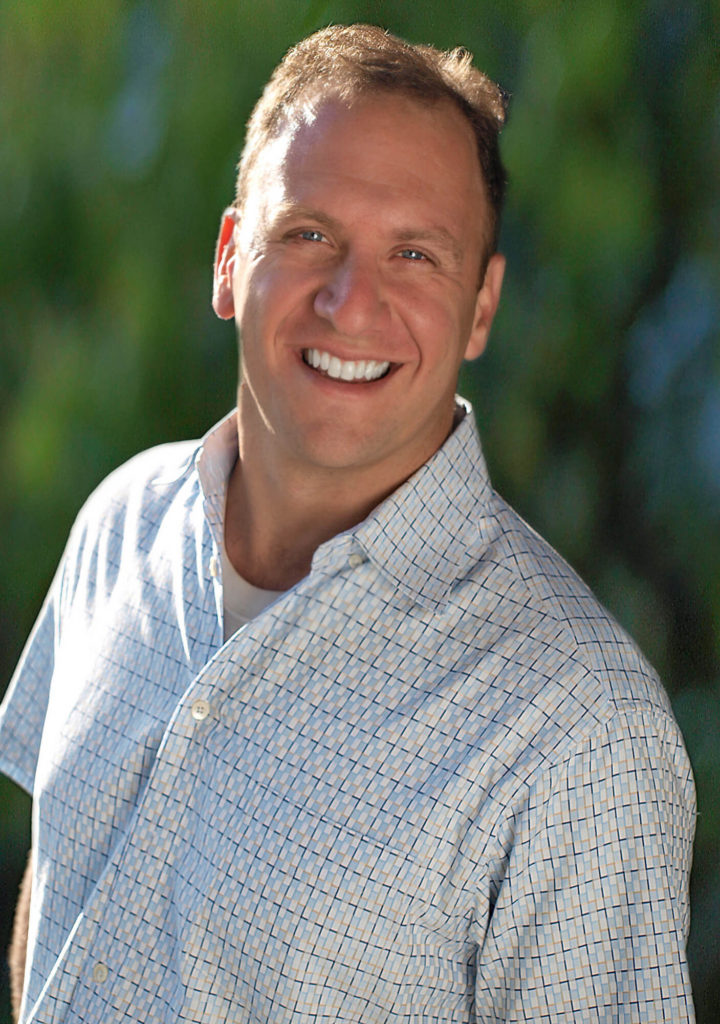
One year ago this past September, I stood before my congregation at Beth El in Durham, NC and tried to teach. But my heart was with my wife Jennifer at home. I cannot speak for Jennifer – ever 🙂 but particularly about what it’s been like to have breast cancer. I can only testify about the particular pain of watching and worrying for your life’s partner; I can only reflect on what insights I’ve managed to glean; how, successfully and not, I related to God in the year that has passed.
A confession, of which I am not proud and which I share more as a mistake to learn from than an example to follow: during that year, I was also in pain, but experienced self-doubt about my suffering. I felt like a “half-sufferer,” I could not silence a voice that minimized the amount of sympathy I would allow myself. The voice came not from Jennifer, nor from anyone around me except myself. It said things like: “I am not the one who has cancer; Jennifer does. She is ‘truly‘ suffering. I am not confronting my mortality, she is.”
The voice also told me I wasn’t having a “true” cancer experience. “Breast cancer, after all, is quite survivable these days,” it said, “until it isn’t,” another voice added. Trying to be of comfort, someone told us that she had heard that “doctors have become so adept at handling breast cancer, it is as routine as the flu or a cold.” This didn’t feel like a flu or the cold. I felt scared, exhausted. I remember talking to the kids, trying to reassure them it would all be okay – and wondering if I was lying to them. Jen had dark moments. I had mine. But that awful, accusatory inner voice compared my suffering to people who “have it worse” and made me feel like an imposter, as if, in feeling all the exhaustion and fear and sadness, I was just being overly dramatic.
When I wanted to cry out, that terrible voice inside of me told me my suffering was more “assumed” or “rhetorical” than “real.” Along with my pain, I felt a sense of guilt, as if by taking time or energy for myself to fall apart or rebuild, I was taking something away from Jennifer, or from others whose illnesses push them statistically closer to death than breast cancer.
Our tradition has a name for that voice – Satan. Yes, Satan. S-A-T-A-N. Not a little red figure with a pitchfork on your shoulder, but initially “adversary,” and by the time of the Book of Job and in rabbinic parlance, Satan means “accuser,” a prosecutorial angel who argues against you before God, pointing out your worst qualities and weaknesses. Satan isn’t someone modern rabbis talk about very much, but Satan does lurk around the Jewish sources.
What lesson did I learn from this accusatory voice? Not to believe it. Not to diminish my suffering. Not to compare it with others. There is no contest of suffering. Each person’s suffering is unique because each person is unique and special to God.
Jewish philosopher Abraham Joshua Heschel wrote: “God is not detached from or indifferent to our joys and griefs. Authentic vital needs of man’s body and soul are a divine concern.” I can never offer conclusive proof of this, but I stake my life on the idea that God cares about each life, each person, each soul. In my best moments, I was able to accept that my journey was no more and no less deserving of God’s compassion and love than anyone else’s. I was able to hear the song that my teacher Reb Mimi sang to me at the moment of my ordination as rabbi: “God’s lovingkindnesses are never exhausted, God’s compassion never ends” (Lamentations 3:2).
I think back too on my experience of prayer this year. Did I pray more often or more intently? Surely I included Jennifer in my prayers with an added urgency. The gratitude I feel for the hundreds – if not thousands – of people around the world who included Jennifer in their prayers is beyond what I can express. But…what did I pray for? A small part of my prayers was – for lack of a better term – to cover our bases. 🙂 If indeed God does control each cell of the universe and could intervene somehow to heal her, well, there was no harm in saying her Hebrew name one more time or with just a little extra oomph! But that vision of God – that if I pray harder or give more to charity or do enough repentance, then God will spare my life – has driven many people away from God. So I “covered my bases” – I gave in to my own superstitious side by praying a little harder for Jen, but also let go of believing in the cause-and-effect of this idea about prayer.
I’ve lost a lot of people close to me. Believing God killed them for something they – or I – did or didn’t do, or that their deaths were justified according to some logic I just didn’t understand, such a vision of God nearly drove me away from God years ago. This past year, I took comfort in a different part of the Jewish tradition, one where the rabbis acknowledge “the world goes according to its way”: cancer happens, accidents happen and I did not need to hold God directly responsible for those things.
Metaphors about God are all insufficient, but words are all we have. There is one image of God I’ve been relating to that has been helpful this year. It comes from a Jewish book for parenting teenagers called The Blessings of a B Minus, in which author Dr. Wendy Mogel argues that too many parents make the mistake of “helicopter parenting” – swooping in and saving our children from themselves before they fail. Mogel sees this as an abdication of our responsibility as parents: instead of micromanaging our children to achieve momentary success, she proposes an image of parents who are present, paying attention and available to answer questions and give the best advice we can; when they need to cry, we are there to dry their tears and to sit beside them until they are ready to get up and move on again. That is how God has felt to me this year: available, helpful, but not someone to Whom I have looked to solve every problem or make every hurt go away.
When we are young, parents sometimes punish us if we misbehave. So I continue to find meaning in asking myself whether some bad things that happen to me are perhaps from God, are perhaps something from which I am supposed to learn and grow. But just as not every bad thing that happens to us as children is caused by our parents, not every bad thing that happens in this world need be thought of as a punishment caused by God. Cancer need not be a punishment from God any more than falling down on the playground is a punishment from our parents – sometimes painful, difficult things just happen.
A good parent is paying attention and available, can dry our eyes, can help us find strength to continue when we don’t think we can anymore, and a good parent sometimes might even be able to help us understand not why bad things happen but how we can grow from them. I believe God is paying attention, that through my amazing community, God gave me and my family strength.
Sometimes I imagine myself like a teenager sitting in my room, alone and in pain, and then finally coming downstairs, seeing God sitting on the couch: I see myself speaking with God. I might say, “hi,” and God might say, “hello dear one.” and God might ask me, “So how are you this year? What do you want to talk about?”
Here’s what I’d say.
Hey there, God. I’m actually doing okay. Last year was hard. Not an easy year. I’m grateful Jennifer is feeling better. Thank you for whatever role you played in that. It’s still hard though. I love the people in my community, but I know there are others who are scared, just like I was a year ago, not knowing what the future holds for them or someone they love. I wish it didn’t have to be that way. I hope those people find You, not because You are going to cure everyone but it helps a lot just to know You’re here, that no one is ever alone.
Thanks for Beth El Synagogue in Durham – it’s a good place. We’re not perfect but, in our best moments – and we have a lot of best moments- we take care of each other. We dry each other’s tears. I hope we are making You proud.
I feel different than I did a few years ago. I can really say now how grateful I am You brought me into this this world. This is a crazy life You’ve given us. Sometimes, up in my room all by myself, I couldn’t say that, couldn’t feel how lucky I am to be in the world. Life just hurts so much sometimes. Sometimes all the love I felt for my friends who died just turned to pain and I thought loss was all there is. I forgot about love and sometimes it hurt so much that I didn’t want to go on anymore. Sometimes it felt like there was only darkness all around, like rushing waters.
King David once wrote this about You: “above the roar of the vast sea and the majestic breakers of the ocean, Adonai stands supreme in the heavens” (Psalm 93).
That’s how I feel about this year. There You were – above the rushing waters., and because You were there, I’m still here, and I’m grateful to be here still.
I’m going to get going now. Thanks for the chat. Pretty neat journey, this thing called life. I’ll do my best to make You proud. Yeah, I know, I know. I’ll try to stay in better touch too. Love you too. Happy new year.

Daniel Greyber is rabbi at Beth El Synagogue in Durham, North Carolina, author of Faith Unravels: A Rabbi’s Struggle with Grief and God (with foreword by Mayim Bialik–more here), and will serve as Team USA Rabbi at the 2017 World Maccabiah Games in Israel. Formerly a Jerusalem Fellow at the Mandel Leadership Institute, a faculty member at the Ziegler School of Rabbinic Studies in Los Angeles, and the Executive Director of Camp Ramah in California, Rabbi Greyber’s articles have been featured in a wide range of Jewish publications.


Grok Nation Comment Policy
We welcome thoughtful, grokky comments—keep your negativity and spam to yourself. Please read our Comment Policy before commenting.